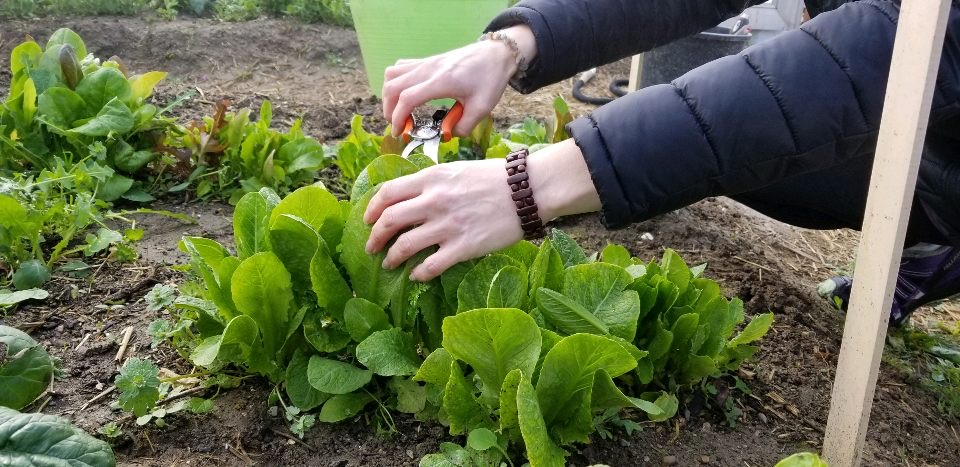
By Maria Archibald, Sustainability Office
As the seasons change and snow dusts the ground, many plants are tucking themselves away for a long winter’s nap. But at the Edible Campus Gardens, student garden stewards are keeping busy—working in the soil and building community spaces that are anti-racist, inclusive, equitable, and just.
Earlier this year, as COVID-19 swept through our communities and people all across the country rose up in defense of Black lives, the garden team began to reconsider its annual initiatives. Students and staff discussed how the gardens could play a role in the movements for food sovereignty and food justice, and they began to craft a plan.
Jessica Kemper, sustainable food initiatives manager for the Sustainability Office, says that internal conversations about food and justice quickly turned to action. “The students wanted to make these thoughts and ideas a little more concrete…so that the gardens continue to follow this track of inclusivity and equity and food justice.”
Sarah Tabak, a recent environmental studies and geography graduate and a current garden steward, explains that “as garden stewards we’re only here for a short time at the gardens—each of us are probably here for about four years or less—and so we wanted to create something that could last five, 10, 20 years into the future.” 
Student employees worked together to establish three core values for the Edible Campus Gardens: reciprocity, compassion, and stewardship. These core values, along with several guiding principles, provide a framework within which current—and future—garden stewards will situate their work.
“We want to make sure that everything the Edible Campus Gardens does is rooted in these values,” says Quinn Case, a garden steward and fourth-year Parks, Recreation, & Tourism student.
This year, the Edible Campus Gardens team is proposing three Sustainable Campus Initiative Fund projects that embody these core values.
The first, a sustainable packaging project, will enable the gardens to continue donating produce to the Feed U Pantry, which combats food insecurity on campus by supplying students and U employees with free food. The gardens usually sell the majority of their produce at the University of Utah Farmers Market, which was canceled in 2020, so this year they donated everything to the Feed U Pantry, Case explains. “It just wouldn’t feel right to [sell produce] when everybody’s in different financial situations—everybody’s dealing with different levels of crisis in their life right now,” Case says.
Tabak agrees: “We are here to support students, not gain wealth from students.”
Garden stewards hope to continue this relationship with the Feed U Pantry and remain a source of food security for students. However, to do so safely during a pandemic, they need materials to package produce in grab-and-go portion sizes.
“We still want to be able to abide by COVID restrictions that are in place, but we want to do it in a sustainable way,” says Case.
The second project proposal is to revamp the gardens’ irrigation system. “We have a system right now that is not very efficient and the tubing that we use is really fragile,” says Kemper. The current irrigation system, she explains, breaks frequently, floods occasionally, only lasts for a season, and is not recyclable. An updated system will not only save garden workers time, but will also ensure that plants receive reliable water and are able to thrive.
“We are very reliant on water to grow our produce, especially in an arid environment…our plants need that water and we need reliable water,” Tabak says. “We want something that’s a little more sustainable into the future because the more that we can grow, the more that we can feed students.”
The final project is one that the garden stewards feel particularly passionate about. The idea arose in the spring, when the onset of COVID-19 led to a nation-wide shortage of seeds. “All of the seeds were being purchased and they were sold out everywhere,” Kemper explains.
In response, the garden stewards hope to initiate a seed-saving project, which will make the Edible Campus Gardens more resilient to future shortages and provide seed access to the broader community.
Seed saving, Tabak explains, is integral to food sovereignty, food security, and food justice. “We are creating our own food system, and we’re not relying on the capitalist food system,” she says. This project will increase the gardens’ resiliency, and will connect community members with the resources they need to grow their own food.
Perhaps the most exciting thing about these new garden initiatives is that they’re completely student led. Tabak explains that the garden stewards have been wanting to increase community access, diversity, and inclusion at the gardens for some time. These projects give them the autonomy to do just that.
